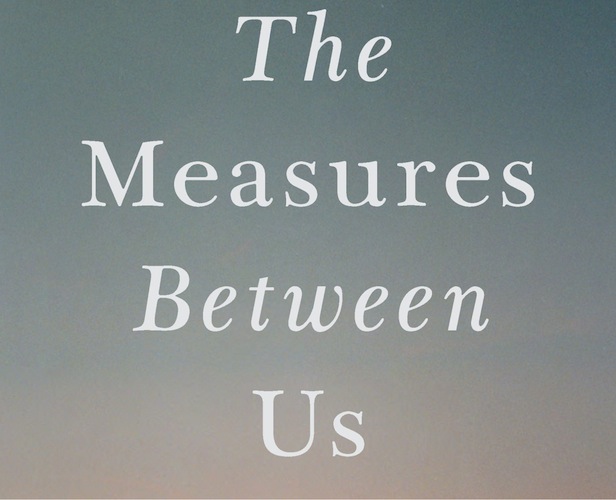Fuse Book Review: “The Measures Between Us” — A Promising But Scattershot First Novel
We are left with a somewhat scattered narrative written in the third person with an omniscient narrator that moves from one inner life to another, sometimes to good effect, and sometimes leaving the reader stranded.
The Measures Between Us, by Ethan Hauser, Bloomsbury, 390 pages, $26.
By Roberta Silman
As a recent transplant to Boston, I was interested in this novel about a suburb of the city, its concern for the rising temperatures which have given rise to the rising rivers, and its ambitious scope. And although I almost always prefer amplitude over literary narrowness (which too often leads to smugness), I was confounded by the lack of focus in this debut novel. The more I read (and I read this novel twice) the more I wondered, Who is the protagonist here? Whom can I root for?
The publicity material claims that Jack, the young intern who works in a lab that is studying extreme weather, is the person who links these somewhat disparate lives, and the book begins and ends with Jack. But the truth is that Jack becomes a minor character in a book that is trying to tell too many stories and which depends too much on coincidence to link these somewhat stifled lives.
So we are left with a somewhat scattered narrative written in the third person with an omniscient narrator that moves from one inner life to another, sometimes to good effect, and sometimes leaving the reader stranded. With the result that the prose, at times lovely and precise, sometimes slacks off and loses urgency. Which is a shame, for Ethan Hauser, who is an editor at The New York Times, knows how to write and has created certain characters with real empathy. Moreover, his central metaphor — that of water threatening to swallow our lives — which seemed absolutely right at the beginning becomes more and more opaque as the novel progresses. So opaque that it begins to seem irrelevant, which was not, I am sure, Hauser’s intention.
The abiding theme of this novel is the often tangled relationship of parents and children. And how instinct does not always prevail, especially among the mothers in this book. One is so frightened by her child’s diagnosis of autism that she checks out by killing herself, which is all the more awful because as the book progresses we see how engaging Brandon can be as he grows older, despite his handicap. Another is pregnant yet so afraid she is going “to hate her baby” that she has to leave her husband and seek the solace of a college acquaintance living in Texas. It is only when she goes to visit White Sands (where the atomic bomb was tested as part of The Manhattan Project) that she has some sort of mysterious epiphany that, hopefully, will help her once the baby is born. And then there is Mary Pareto, who has never been a confident mother and is forced to confront her only child’s mental illness in ways that are utterly heartbreaking.

Ethan Hauser — He knows how to write and has created certain characters with real empathy. Photo: Michael Waring.
I suppose you could say that the linchpin of the book is Cynthia, the young woman who goes out with Jack, who babysits for Brandon and whose parents are Mary and Vincent Pareto. She is certainly a complicated character, who is reluctant to let anyone, including the reader, in. This may have been Hauser’s intent, yet it quite literally muddies the waters — if you want to continue with his prevailing metaphor. But the set-up is not convincing. When Vincent, who teaches woodworking at the high school, consults his former student Henry Wheeling, now a psychologist at Boston University and part of the project on which Jack is working, about what to do with their daughter, I found myself shaking my head in disbelief. A couple finds a number of bottles of aspirin in their daughter’s bathroom and the father consults a former student he barely knows. There had to be a doctor who could guide him and Mary; besides, Vincent is too intelligent for such blind groping. Thus, I felt manipulated by Hauser. What was he thinking? Or is the character of Henry Wheeling and his tiresome story (an affair with a very pretty graduate student) part of a former short story or even a novel that Hauser didn’t quite know what to do with?
But the reader has no choice but to accept what the author gives him. And once I suspended my disbelief, I began to feel for Cynthia when she goes to Rangeley, an upscale mental hospital in Belmont, and reveals more of herself as she encounters people far worse than she is. Perhaps there is some hope for this child. Here she is talking to her doctor after her friend Evan has made a grisly suicide attempt:
Maybe last night . . . she heard some random noise that woke her up, and she blinked a few times, and she saw this crushing idea in front of her, even though we’re so much older now. Maybe it had nothing to do with cocaine. Maybe she finally understood: that you are alone, totally fucking alone, there is no one who will always be there for you, to take care of you and tell you everything is okay, and that’s what you are destined to be in this world, no matter what you do, how much good you do, how much you let yourself love someone–alone, no matter how much anyone tries to love you and hold you, and she didn’t feel strong enough to face that. It was easier and less painful to give up. More painful for a few seconds, but then, relief, just relief.
Dr. Eliot leaned forward. He was holding a box of Kleenex, offering it to Cynthia so she could wipe away her tears.
And when she comes home and she and her mother take over the novel, especially when we are in Mary’s mind, we see how too many silences and fear can warp a childhood. Even with the best intentions, and even with a father as loving and brave as Vincent. As Mary grows in awareness, and in the scenes where she follows Cynthia (although she thinks of it as “chasing her child”) when her daughter takes long solitary car rides, the novels gains urgency and pulls the reader in as it hasn’t done before.
That’s why the ambiguous ending is such a downer, especially given that we find ourselves in the midst of an argument that is totally unbelievable given Vincent’s innate dignity. So, although Hauser probably conceived this novel as the story of a small community where everyone is linked, as they often are in these little suburbs, I feel he would have been better off if he had tried to tell the Pareto family’s story more simply, maybe using Jack more effectively as a one-man Greek chorus. Perhaps in his next foray into fiction Ethan Hauser will think through his narrative more fully and it will have the inner logic that every really good novel needs.
Roberta Silman is the author of Blood Relations, a story collection now available as an ebook; three novels, Boundaries, The Dream Dredger, and Beginning the World Again; and a children’s book, Somebody Else’s Child. She writes regularly for The Arts Fuse and can be reached at rsilman@verizon.net.



Thanks for this thoughtful review, which regrets missed chances and ignores ‘buzz’ but is in no way mean-spirited.